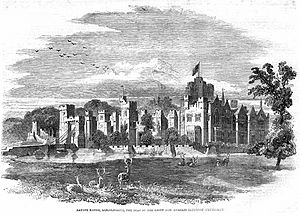Charles Tennyson d'Eyncourt facts for kids
Quick facts for kids
Charles Tennyson d'Eyncourt
|
|
|---|---|
| Member of Parliament for Lambeth | |
| In office 1832–1852 Serving with Benjamin Hawes, Charles Pearson, William Williams
|
|
| Preceded by | New constituency |
| Succeeded by | William Arthur Wilkinson William Williams |
| Member of Parliament for Stamford | |
| In office 1831–1832 Serving with Lord Thomas Cecil
|
|
| Preceded by | Lord Thomas Cecil Thomas Chaplin |
| Succeeded by | Thomas Chaplin George Finch |
| Clerk of the Ordnance | |
| In office December 1830 – February 1832 |
|
| Preceded by | Spencer Perceval |
| Succeeded by | Thomas Francis Kennedy |
| Member of Parliament for Bletchingley | |
| In office 1826–1831 Serving with William Russell, Hon, William Lamb, William Ewart, Robert William Mills, William Horne, Hon. John Ponsonby
|
|
| Preceded by | Lord Francis Leveson-Gower Edward Henry Edwardes |
| Succeeded by | Thomas Hyde Villiers Henry John Temple |
| Member of Parliament for Great Grimsby | |
| In office 1818–1826 Serving with John Nicholas Fazakerley, William Duncombe
|
|
| Preceded by | Sir Robert Heron, Bt John Peter Grant |
| Succeeded by | Charles Wood George Heneage |
| Personal details | |
| Born |
Charles Tennyson
20 July 1784 |
| Died | 21 July 1861 (aged 77) |
| Spouses |
Frances Mary Hutton
(m. 1808) |
| Relations | Alfred, Lord Tennyson (nephew) |
| Parents | George Tennyson Elizabeth Clayton |
| Residence | Bayons Manor |
| Alma mater | St John's College, Cambridge |
Charles Tennyson d'Eyncourt (born Charles Tennyson) was an important British politician and landowner. He was born on July 20, 1784, and passed away on July 21, 1861. He served as a Member of Parliament (MP) for different areas, including Stamford from 1831 to 1832 and Lambeth from 1832 to 1852.
Charles was also known for wanting to seem very important in society. He sometimes acted unkindly towards his famous nephew, the poet Alfred Lord Tennyson. He studied at St John's College, Cambridge.
Contents
Early Life and Family History
Charles Tennyson d'Eyncourt was the younger son of Elizabeth (whose maiden name was Clayton) and George Tennyson. His father bought a large family estate called Bayons in Tealby, Lincolnshire. This estate included 2,000 acres (about 8 square kilometers) of land.
When Charles was 12, his older brother, George Clayton Tennyson, was not chosen to inherit the family's wealth. Instead, George became a churchman, and the family fortune was given to Charles. This decision caused some bad feelings between Charles's family at Bayons and his brother's family in Somersby. Charles's family thought they were more important socially.
His mother, Elizabeth, was the daughter and heir of John Turner. She believed her family was connected to old noble families like the Lords of Lovel and d'Eyncourt. She even claimed to be related to King Edward III.
Political Career and Achievements
After his father died in 1835, Charles inherited the family estates. He then changed his family's name to Tennyson d'Eyncourt. This was because part of the property included a ruined castle. Charles wanted to show that his family had a long and noble history.
He renamed his home "Beacons" to Bayons, making it sound like a Norman castle. He then rebuilt and expanded it to look like a grand Gothic castle.
Serving in Parliament
Charles Tennyson d'Eyncourt was a MP for Lambeth for many years. In 1832, he became a Privy Counsellor. This is a special group of advisors to the British monarch.
In the 1830s, he tried to bring back the Knights Templar as a British order of chivalry, which is a special group of knights. However, this plan did not succeed. He also tried to get a noble title for himself and his family, but he was unsuccessful. In 1829, he was chosen as a Fellow of the Royal Society, which is a group of top scientists.
His Writings and Family Rivalry
In 1850, Charles published a book of poems called Eustace. He wrote it to remember his youngest son, who had passed away. Unfortunately for Charles, his nephew Alfred Tennyson's famous poem, In Memoriam, was published at the same time. Charles's book was not as popular.
Charles did not like his nephew Alfred's poetry at all. He called it "Horrid rubbish." He was very upset when Alfred became the Poet Laureate (the official poet of the country) and was offered a special title. Charles did not live to see his nephew Alfred become a Lord.
Family Life
On January 1, 1808, Charles Tennyson married Frances Mary Hutton. She was the only child and heir of Rev. John Hutton. Together, they had eight children: five sons and three daughters.
- George Hildeyard Tennyson D'Eyncourt (1809–1871)
- Edwin Clayton Tennyson d'Eyncourt (1813–1903), who became an Admiral in the Royal Navy.
- Louis Charles Tennyson D'Eyncourt (1814–1896)
- Eustace Alexander Tennyson D'Eyncourt (1816–1842), who was his favorite son and died from yellow fever in Barbados.
- Ellen Elizabeth Tennyson D'Eyncourt (1817–1900)
- William Henry Tennyson D'Eyncourt (1819–1819), who died as a baby.
- Julia Frances Tennyson D'Eyncourt (died 1879), who became a nun.
- Clara Maria Tennyson D'Eyncourt (died 1863)
Charles Tennyson d'Eyncourt passed away on July 21, 1861. His wife, Frances, died in January 1878.
Future Generations
The Tennyson d'Eyncourt family eventually received a special title in the early 1900s. A very important member of the family was Sir Eustace Tennyson d'Eyncourt (1868–1951). He was a famous naval architect and was in charge of designing ships for the Royal Navy in the early 20th century.
Images for kids
 | William M. Jackson |
 | Juan E. Gilbert |
 | Neil deGrasse Tyson |



